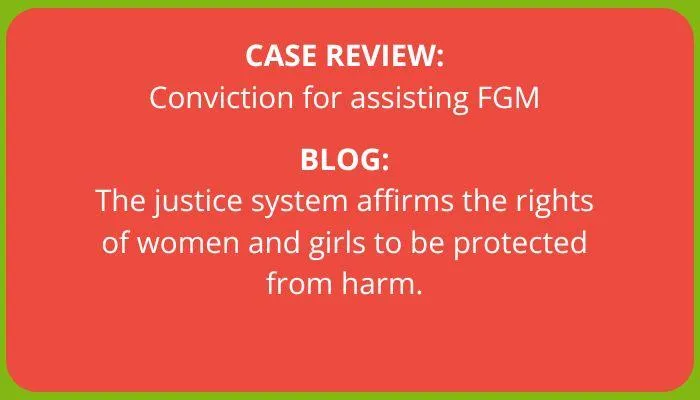Every child's well-being matters.
Case Review Articles
Quick access:
VICTIMS
ADULT ACTIONS
Alison Kelly – data issue
Amina Noor (FGM)
Quick access:
VICTIMS
ADULT ACTIONS
Alison Kelly – data issue
Amina Noor (FGM)

Amina Noor's Conviction for Assisting Female Genital Mutilation FGM
Amina Noor's Conviction
Folllwing a groundbreaking legal development, Amina Noor has been convicted for her involvement in aiding female genital mutilation (FGM) on a three-year-old British girl during a trip to Kenya in 2006. This marks a significant step forward in the fight against FGM, shedding light on the persistence of this harmful practice and the importance of holding accountable those who facilitate it.
FGM, also known as female circumcision or cutting, is a deeply ingrained cultural tradition in some communities despite its severe physical and psychological consequences. It involves the partial or total removal of external female genitalia or other injury to the genital organs, often without medical necessity. The practice is widely condemned globally for its violation of human rights and its harmful effects on the health and well-being of women and girls.
Amina Noor's involvement in assisting FGM during a trip to Kenya underscores the international dimension of this issue. While FGM is illegal in the UK, it is still practised in some countries where laws against it may be less strictly enforced. Noor's conviction highlights the UK's commitment to combating FGM within its borders and beyond, ensuring that individuals who participate in or facilitate this practice are held accountable under the law.
The legal ramifications of Noor's conviction are significant. With a maximum sentence of 14 years, the punishment's severity reflects the offence's gravity. It sends a strong message about the consequences of engaging in FGM-related activities. By holding Noor accountable, the justice system affirms the rights of women and girls to be protected from harm and demonstrates that perpetrators of FGM will face the full force of the law.
Moreover, Noor's conviction serves as a milestone in raising awareness about FGM and advocating for its eradication. By bringing attention to the issue through legal proceedings, the case prompts broader conversations about FGM's cultural, social, and health implications. It underscores the importance of education, outreach, and advocacy efforts aimed at preventing FGM, supporting survivors and promoting gender equality and women's rights worldwide.
In conclusion, Amina Noor's conviction for assisting FGM represents a significant victory in the fight against this harmful practice. It highlights the international nature of the issue and the need for coordinated efforts to address it comprehensively. Moving forward, it is essential to continue advocating for policies and interventions aimed at ending FGM, protecting the rights of women and girls, and ensuring that justice is served for survivors and their families for Assisting Female Genital Mutilation.
AUTHOR:- Iona has nearly 10 years of experience supporting nurseries and childminders in curriculum planning, leadership, and safeguarding. Her writing is informed by public information and sector insight, aiming to provide accessible, practical support for professionals working with children. She is part of the On the Button team, helping deliver Well-being, Safeguarding and Complaint Management Software that empowers practitioners to identify concerns early and act confidently.
On the Button provides innovative software tailored to the needs of the early years sector, with a strong focus on EYFS well-being and early years safeguarding. Our tools help senior practitioners to confidently track concerns, maintain robust records, and respond effectively — all while meeting statutory guidance. From early years complaint management to team-wide safeguarding alerts, our platform puts children's safety and emotional health first.

Amina Noor's Conviction for Assisting Female Genital Mutilation FGM
Amina Noor's Conviction
Folllwing a groundbreaking legal development, Amina Noor has been convicted for her involvement in aiding female genital mutilation (FGM) on a three-year-old British girl during a trip to Kenya in 2006. This marks a significant step forward in the fight against FGM, shedding light on the persistence of this harmful practice and the importance of holding accountable those who facilitate it.
FGM, also known as female circumcision or cutting, is a deeply ingrained cultural tradition in some communities despite its severe physical and psychological consequences. It involves the partial or total removal of external female genitalia or other injury to the genital organs, often without medical necessity. The practice is widely condemned globally for its violation of human rights and its harmful effects on the health and well-being of women and girls.
Amina Noor's involvement in assisting FGM during a trip to Kenya underscores the international dimension of this issue. While FGM is illegal in the UK, it is still practised in some countries where laws against it may be less strictly enforced. Noor's conviction highlights the UK's commitment to combating FGM within its borders and beyond, ensuring that individuals who participate in or facilitate this practice are held accountable under the law.
The legal ramifications of Noor's conviction are significant. With a maximum sentence of 14 years, the punishment's severity reflects the offence's gravity. It sends a strong message about the consequences of engaging in FGM-related activities. By holding Noor accountable, the justice system affirms the rights of women and girls to be protected from harm and demonstrates that perpetrators of FGM will face the full force of the law.
Moreover, Noor's conviction serves as a milestone in raising awareness about FGM and advocating for its eradication. By bringing attention to the issue through legal proceedings, the case prompts broader conversations about FGM's cultural, social, and health implications. It underscores the importance of education, outreach, and advocacy efforts aimed at preventing FGM, supporting survivors and promoting gender equality and women's rights worldwide.
In conclusion, Amina Noor's conviction for assisting FGM represents a significant victory in the fight against this harmful practice. It highlights the international nature of the issue and the need for coordinated efforts to address it comprehensively. Moving forward, it is essential to continue advocating for policies and interventions aimed at ending FGM, protecting the rights of women and girls, and ensuring that justice is served for survivors and their families for Assisting Female Genital Mutilation.
AUTHOR:- Iona has nearly 10 years of experience supporting nurseries and childminders in curriculum planning, leadership, and safeguarding. Her writing is informed by public information and sector insight, aiming to provide accessible, practical support for professionals working with children. She is part of the On the Button team, helping deliver Well-being, Safeguarding and Complaint Management Software that empowers practitioners to identify concerns early and act confidently.
On the Button provides innovative software tailored to the needs of the early years sector, with a strong focus on EYFS well-being and early years safeguarding. Our tools help senior practitioners to confidently track concerns, maintain robust records, and respond effectively — all while meeting statutory guidance. From early years complaint management to team-wide safeguarding alerts, our platform puts children's safety and emotional health first.




Facebook
Instagram
LinkedIn
Youtube